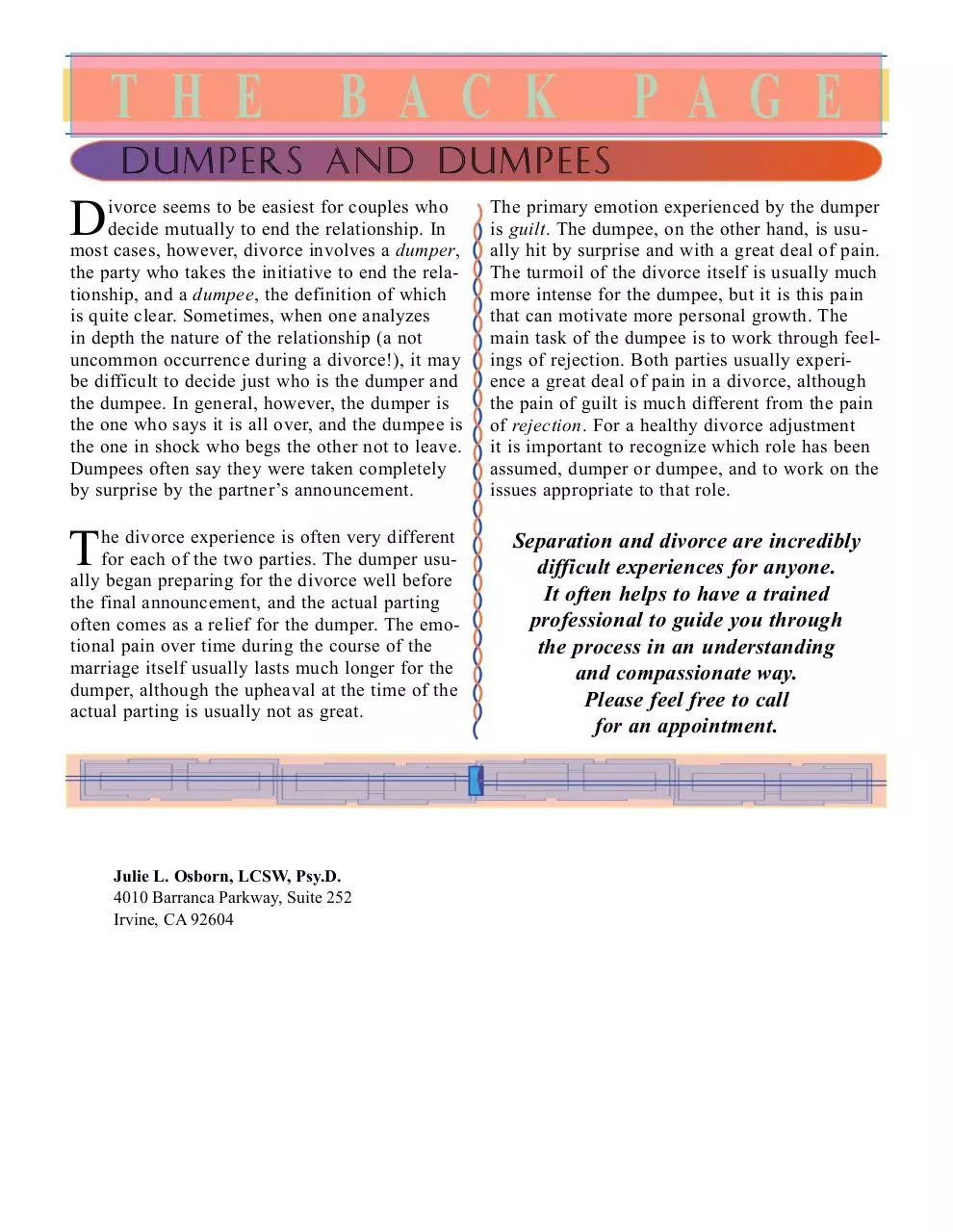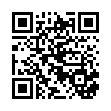Losing Your Relationship Newsletter (PDF)
File information
This PDF 1.5 document has been generated by Adobe InDesign CS6 (Windows) / Adobe PDF Library 10.0.1, and has been sent on pdf-archive.com on 23/02/2016 at 18:24, from IP address 209.36.x.x.
The current document download page has been viewed 430 times.
File size: 357.49 KB (4 pages).
Privacy: public file




File preview
VOLUME XXIII, NUMBER 2
Most divorcing people are forced
to come to terms with a number of
fears. What will people say?
W
ho can I trust to talk to? How can I handle
my partner’s anger toward me? How do
I deal with my own anger? Am I a complete
failure? How can I be a single parent? Will I be
able to keep my children? What about money?
Can I do the banking and buy groceries and pay
bills and fix the car? Can I handle my loneliness? Am I completely unlovable? Will I ever
love anyone else again? Do I have the energy
for this much change? When we hold on to our
fears and refuse to do anything about them, we
increase the likelihood that these will be the
very areas where we experience trouble.
Loneliness – The loneliness one experienc-
es at the time of divorce can feel immeasurable.
The finality of the marriage, the uncertainty
about the future, and the knowledge that your
partner will no longer be there to comfort you
or to spend time with you, can all contribute to
an empty feeling that will not go away. The clue
is to change loneliness to aloneness, to change
the emptiness to a feeling of peace, contentment, and fulfillment. Looking into oneself and
liking what one sees is a key to making the shift
Julie L. Osborn, LCSW, Psy.D.
Degrees: BSW, MSW, Psy.D.
Licensed Clinical Social Worker
California Social Work License LCS17861
4010 Barranca Parkway
Suite 252
Irvine, California 92604
949-224-3136
Website –
www.mycognitivebehavioraltherapy.com
Dr. Osborn specializes in Cognitive Behavioral
Therapy, which is the most effective and well
studied modality of psychotherapy.
Her clients include adults, couples,
families & adolescents.
Dr. Osborn teaches her clients to be their own
therapists so their therapy can be short-term
and they will learn lifelong skills to improve
their mental health!
to aloneness. (Get into being alone. It is a
precious but tenuous gift that can disappear
far too quickly from one’s life.)
Anger – People in divorce usually say
that they never knew they could have so
much anger. The rage seems overwhelming at times. No ... you are not going crazy!
Think about it: you have just lost one of the
most important things in your life and your
partner is now in many ways your enemy.
You have a lot to be angry about. Use this
opportunity to explore your anger and to find
out how it helps and hurts you. One divorce
rule: don’t engage in any behaviors you will
feel sorry about later on! Anger is helpful in
the sense that it helps us end the loyalty and
trust we used to feel for our partner, and this
allows us to move on.
Friendship – Divorce is a true test of
just who your real friends are. It is important
to draw on the emotional support of friends
during a divorce. Unfortunately, many of
your friends were those who knew you as a
couple and they often must choose between
you. Even those who try to stay neutral find
it difficult. Many may feel that your divorce
somehow threatens their own marriages and
some friends may now find it difficult to
relate to you as a single person. Not only
that, but you may find it difficult to trust
others during a divorce. Getting out, feeling
free, and opening up to others becomes a
major goal of a healthy divorce adjustment.
T
hink of divorce as a journey which you
take one step at a time. And some of
those steps are very hard to get through. Not
only do we have to confront all of the stages
listed above, but we must also deal with
making the final break emotionally from
our partner, understanding what really went
wrong, learning to like ourselves again, seeing ourselves as single people, making new
friends, forging new purposes and goals for
our lives, and learning again about trust and
love. As painful as this journey may seem at
first, it can lead to a life which is better ...
much better.
Grieving – It is normal, and even necessary, to experience a period of grieving over
the end of the relationship.
You may feel depressed for
some time and experience
changes in your energy levels
and sleeping and appetite patterns. As unpleasant as it may
feel, comfort yourself with
the knowledge that this is how
you are saying goodbye so that you
can move on to a healthier and happier
future.
How Long Do I Wait
Until I Get Into Another
Relationship?
E
xpect that it will take at least a year
before things begin to feel at all normal again. For most of us, depending on
the length and the nature of our previous
This newsletter is intended to offer general information only and recognizes that
individual issues may differ from these broad guidelines. Personal issues should
be addressed within a therapeutic context with a professional familiar with the
details of the problems. ©2015 Simmonds Publications: 5580 La Jolla Blvd.,
306, La Jolla, CA 92037
•
Website ~ www.emotionalwellness.com
2
relationship, it will take two or three years.
This may seem like an eternity, but in reality
this is a wonderful opportunity to find out
who you are at this stage of your life as an
unattached individual. A word of warning is
in order: don’t expect to reinvolve yourself
with someone else immediately! You are on
the rebound. To attach yourself prematurely
in a love relationship is unfair to
you and to the other person.
You are necessarily dealing with tremendously
important personal
issues when your
previous love
relationship
comes to an
end. Living
through the
transition
and exploring these
issues can be
very painful,
and falling in
love again may
seem like the
perfect way to
end the pain. But
the other person in
this case becomes a
replacement, an object,
and that is not what a
healthy relationship is about.
You will carry into this replacement relationship the
same issues which helped
to lead to the demise
of your former relationship ... and the same
things may very well happen again. Your
real goal is to discover who you are and to
explore what happened. When you are at
the point of being able to have a happy and
fulfilled life as a single person, then you can
choose when, or even if, you should reinvolve yourself again in another love relationship. When you know that you have that
choice, you may be ready.
3
T H E
D
B A C K
P A G E
Du mp e r s a n d Du m p ees
ivorce seems to be easiest for couples who
decide mutually to end the relationship. In
most cases, however, divorce involves a dumper,
the party who takes the initiative to end the relationship, and a dumpee, the definition of which
is quite clear. Sometimes, when one analyzes
in depth the nature of the relationship (a not
uncommon occurrence during a divorce!), it may
be difficult to decide just who is the dumper and
the dumpee. In general, however, the dumper is
the one who says it is all over, and the dumpee is
the one in shock who begs the other not to leave.
Dumpees often say they were taken completely
by surprise by the partner’s announcement.
T
he divorce experience is often very different
for each of the two parties. The dumper usually began preparing for the divorce well before
the final announcement, and the actual parting
often comes as a relief for the dumper. The emotional pain over time during the course of the
marriage itself usually lasts much longer for the
dumper, although the upheaval at the time of the
actual parting is usually not as great.
Julie L. Osborn, LCSW, Psy.D.
4010 Barranca Parkway, Suite 252
Irvine, CA 92604
The primary emotion experienced by the dumper
is guilt. The dumpee, on the other hand, is usually hit by surprise and with a great deal of pain.
The turmoil of the divorce itself is usually much
more intense for the dumpee, but it is this pain
that can motivate more personal growth. The
main task of the dumpee is to work through feelings of rejection. Both parties usually experience a great deal of pain in a divorce, although
the pain of guilt is much different from the pain
of rejection. For a healthy divorce adjustment
it is important to recognize which role has been
assumed, dumper or dumpee, and to work on the
issues appropriate to that role.
Separation and divorce are incredibly
difficult experiences for anyone.
It often helps to have a trained
professional to guide you through
the process in an understanding
and compassionate way.
Please feel free to call
for an appointment.
Download Losing Your Relationship Newsletter
Losing Your Relationship Newsletter.pdf (PDF, 357.49 KB)
Download PDF
Share this file on social networks
Link to this page
Permanent link
Use the permanent link to the download page to share your document on Facebook, Twitter, LinkedIn, or directly with a contact by e-Mail, Messenger, Whatsapp, Line..
Short link
Use the short link to share your document on Twitter or by text message (SMS)
HTML Code
Copy the following HTML code to share your document on a Website or Blog
QR Code to this page

This file has been shared publicly by a user of PDF Archive.
Document ID: 0000342555.